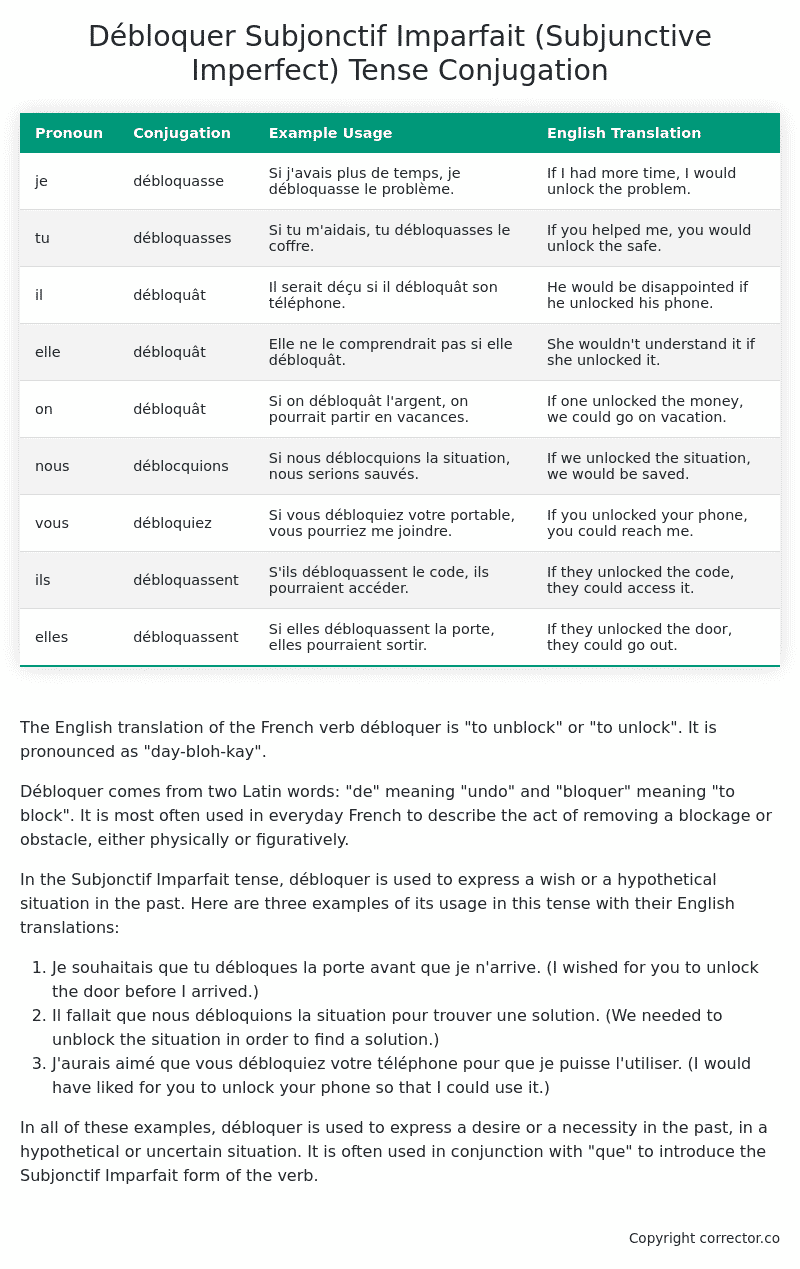Subjonctif Imparfait (Subjunctive Imperfect) Tense Conjugation of the French Verb débloquer
Introduction to the verb débloquer
The English translation of the French verb débloquer is “to unblock” or “to unlock”. It is pronounced as “day-bloh-kay”.
Débloquer comes from two Latin words: “de” meaning “undo” and “bloquer” meaning “to block”. It is most often used in everyday French to describe the act of removing a blockage or obstacle, either physically or figuratively.
In the Subjonctif Imparfait tense, débloquer is used to express a wish or a hypothetical situation in the past. Here are three examples of its usage in this tense with their English translations:
- Je souhaitais que tu débloques la porte avant que je n’arrive. (I wished for you to unlock the door before I arrived.)
- Il fallait que nous débloquions la situation pour trouver une solution. (We needed to unblock the situation in order to find a solution.)
- J’aurais aimé que vous débloquiez votre téléphone pour que je puisse l’utiliser. (I would have liked for you to unlock your phone so that I could use it.)
In all of these examples, débloquer is used to express a desire or a necessity in the past, in a hypothetical or uncertain situation. It is often used in conjunction with “que” to introduce the Subjonctif Imparfait form of the verb.
Table of the Subjonctif Imparfait (Subjunctive Imperfect) Tense Conjugation of débloquer
| Pronoun | Conjugation | Example Usage | English Translation |
|---|---|---|---|
| je | débloquasse | Si j’avais plus de temps, je débloquasse le problème. | If I had more time, I would unlock the problem. |
| tu | débloquasses | Si tu m’aidais, tu débloquasses le coffre. | If you helped me, you would unlock the safe. |
| il | débloquât | Il serait déçu si il débloquât son téléphone. | He would be disappointed if he unlocked his phone. |
| elle | débloquât | Elle ne le comprendrait pas si elle débloquât. | She wouldn’t understand it if she unlocked it. |
| on | débloquât | Si on débloquât l’argent, on pourrait partir en vacances. | If one unlocked the money, we could go on vacation. |
| nous | déblocquions | Si nous déblocquions la situation, nous serions sauvés. | If we unlocked the situation, we would be saved. |
| vous | débloquiez | Si vous débloquiez votre portable, vous pourriez me joindre. | If you unlocked your phone, you could reach me. |
| ils | débloquassent | S’ils débloquassent le code, ils pourraient accéder. | If they unlocked the code, they could access it. |
| elles | débloquassent | Si elles débloquassent la porte, elles pourraient sortir. | If they unlocked the door, they could go out. |
Other Conjugations for Débloquer.
Le Present (Present Tense) Conjugation of the French Verb débloquer
Imparfait (Imperfect) Tense Conjugation of the French Verb débloquer
Passé Simple (Simple Past) Tense Conjugation of the French Verb débloquer
Passé Composé (Present Perfect) Tense Conjugation of the French Verb débloquer
Futur Simple (Simple Future) Tense Conjugation of the French Verb débloquer
Futur Proche (Near Future) Tense Conjugation of the French Verb débloquer
Plus-que-parfait (Pluperfect) Tense Conjugation of the French Verb débloquer
Passé Antérieur (Past Anterior) Tense Conjugation of the French Verb débloquer
Futur Antérieur (Future Anterior) Tense Conjugation of the French Verb débloquer
Subjonctif Présent (Subjunctive Present) Tense Conjugation of the French Verb débloquer
Subjonctif Passé (Subjunctive Past) Tense Conjugation of the French Verb débloquer
Subjonctif Imparfait (Subjunctive Imperfect) Tense Conjugation of the French Verb débloquer (this article)
Subjonctif Plus-que-parfait (Subjunctive Pluperfect) Tense Conjugation of the French Verb débloquer
Conditionnel Présent (Conditional Present) Tense Conjugation of the French Verb débloquer
Conditionnel Passé (Conditional Past) Tense Conjugation of the French Verb débloquer
L’impératif Présent (Imperative Present) Tense Conjugation of the French Verb débloquer
L’infinitif Présent (Infinitive Present) Tense Conjugation of the French Verb débloquer
Struggling with French verbs or the language in general? Why not use our free French Grammar Checker – no registration required!
Get a FREE Download Study Sheet of this Conjugation 🔥
Simply right click the image below, click “save image” and get your free reference for the débloquer Subjonctif Imparfait tense conjugation!

Débloquer – About the French Subjonctif Imparfait (Subjunctive Imperfect) Tense
Formation
Common Everyday Usage Patterns
Interactions with Other Tenses
Subjonctif Présent
Indicatif Passé Composé
Conditional
Conditional Perfect
Summary
I hope you enjoyed this article on the verb débloquer. Still in a learning mood? Check out another TOTALLY random French verb conjugation!


